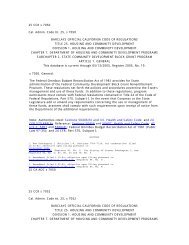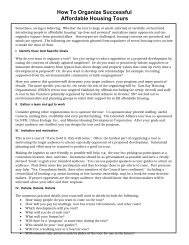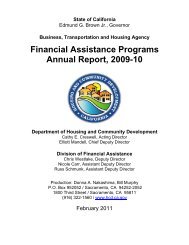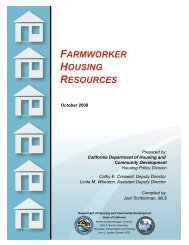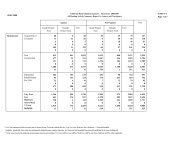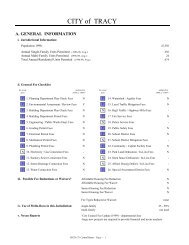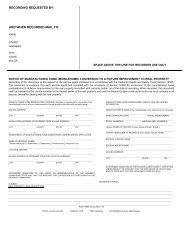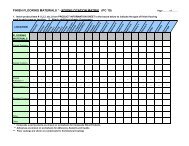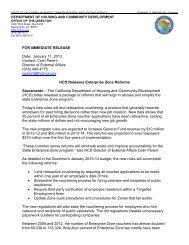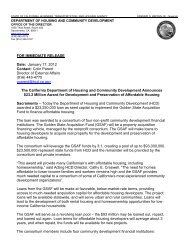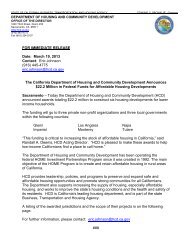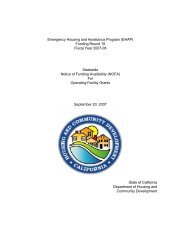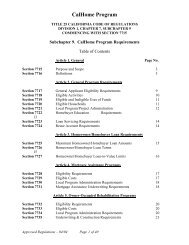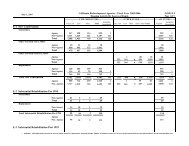Consumer Advice 10-30 - California Department of Housing and ...
Consumer Advice 10-30 - California Department of Housing and ...
Consumer Advice 10-30 - California Department of Housing and ...
Create successful ePaper yourself
Turn your PDF publications into a flip-book with our unique Google optimized e-Paper software.
IMPORTANT CONSUMER ADVICE WHEN<br />
PURCHASING A MANUFACTURED HOME<br />
If you are buying a manufactured home to replace one lost in the Southern <strong>California</strong><br />
fires, or an existing home in another park, there are many important details to consider<br />
to protect yourself <strong>and</strong> your family from delays or financial harm. These guidelines<br />
provide advice regarding common concerns.<br />
Who Can You Buy a Manufactured Home From?<br />
In <strong>California</strong>, new manufactured homes generally are purchased only from licensed<br />
dealers, or salespersons working for a licensed dealer; the <strong>California</strong> <strong>Department</strong> <strong>of</strong><br />
<strong>Housing</strong> <strong>and</strong> Community Development (HCD) licenses both dealers <strong>and</strong> salespersons.<br />
You may purchase a new home over the Internet from an unlicensed dealer, but see the<br />
warnings below.<br />
Used manufactured housing may be purchased through a licensed manufactured home<br />
dealer or salesperson, through a real estate broker or salesperson licensed by the<br />
<strong>California</strong> <strong>Department</strong> <strong>of</strong> Real Estate (DRE), or directly from a private owner/seller. In<br />
certain circumstances, a mobilehome park owner may sell directly, either because the<br />
owner is a licensed dealer or because the owner is selling a unit obtained from a former<br />
resident. Always ask for pro<strong>of</strong> <strong>of</strong> the authority <strong>of</strong> the seller <strong>and</strong>, if a private person,<br />
pro<strong>of</strong> <strong>of</strong> ownership before signing documents or providing funds. To verify HCD<br />
licensee information, call HCD’s Occupational Licensing Unit at (916) 323-9803 or use<br />
HCD’s website at http://www.hcd.ca.gov/codes/ol/ol_lic_query_cover.html. To verify<br />
DRE licensee information, consumers may use HCD’s website to link to DRE’s website<br />
or contact DRE’s Occupational Licensing unit at (916) 227-0931.<br />
What About the Internet?<br />
It is not illegal for a buyer to purchase a manufactured home over the Internet.<br />
However, it is illegal for an unlicensed out-<strong>of</strong>-state person or company to solicit sales in<br />
<strong>California</strong> through advertising, telephone calls, or other in-state contacts. There are<br />
several critical problems with Internet sales:<br />
• Selling companies are not licensed here, <strong>and</strong> do not have a legal obligation to<br />
provide documentation, disclosures, <strong>and</strong> other important information.<br />
• If there is a problem with the sale, you may have limited legal recourse against<br />
an out-<strong>of</strong>-state party except in the dealer’s state or federal court.<br />
• The purchase price may not include all m<strong>and</strong>atory costs, including installation,<br />
transportation, local fees, accessories, etc. In addition, the true price may be<br />
concealed by the lack <strong>of</strong> disclosure that the homeowner will have to pay a<br />
<strong>California</strong> use tax on goods purchased outside the state; for example, a<br />
$150,000 manufactured home results in a state tax <strong>of</strong> about $7,000 or more.<br />
• Your warranty rights related to construction defects or failure to comply with the<br />
contract may be reduced with Internet sales.<br />
• Use <strong>of</strong> an out-<strong>of</strong>-state escrow company may not protect you or your funds: these<br />
companies are not regulated or licensed to do business in <strong>California</strong>, are not<br />
1 <strong>of</strong> 3 <strong>10</strong>/<strong>30</strong>/07
subject to <strong>California</strong> laws <strong>and</strong> requirements, <strong>and</strong> may not even have adequate<br />
funding, leaving you still liable to a manufacturer if the manufactured home is not<br />
fully paid even though you paid the full price to the out-<strong>of</strong>-state escrow company.<br />
Choosing a New Home: Step One<br />
Even before you go to a dealer, you must contact the park management to find out what<br />
restrictions there may be on new homes in the park: Are there size requirements?<br />
Are there amenity requirements related to patios, stairs, etc.? What is the maximum<br />
electrical capacity for the space <strong>and</strong> park (normally referring to “amperage”)? Are there<br />
any other park restrictions? If you are purchasing the home to place on private<br />
property, you must be sure that local ordinances <strong>and</strong> infrastructure permit it.<br />
Choosing a New Home: Step Two (Buying from a Licensed Dealer)<br />
When buying a new or used manufactured home from a licensed dealer, any deposit or<br />
down payment checks must be made payable to an escrow company <strong>and</strong> not the<br />
dealer. A cash deposit does not provide a paper trail protection.<br />
The sales agreement must be in writing, signed <strong>and</strong> dated by both parties. It should<br />
include a receipt for deposit or down payment (even if a check is used); <strong>and</strong> all home<br />
details such as color, flooring, upgrades, change orders, etc. All options must be<br />
individually itemized <strong>and</strong> priced, or the sales agreement should state they are included<br />
in the home price.<br />
All manufactured homes sales through a licensed dealer must go through an escrow<br />
company, <strong>and</strong> consumers should ensure that the sales agreement <strong>and</strong> escrow<br />
instructions clearly state when partial payments <strong>and</strong> final payment are to be released.<br />
Escrow instructions are negotiable to the extent m<strong>and</strong>ated by law.<br />
The sales agreement must state if the price includes set-up <strong>and</strong>/or delivery or delivery<br />
options. If the dealer is responsible for installation, the sales agreement must identify<br />
the installation contractor <strong>and</strong> the type <strong>of</strong> foundation system to be used. The agreement<br />
also should state in writing: who is responsible for obtaining <strong>and</strong> paying the cost <strong>of</strong><br />
permits; specify removal <strong>of</strong> an old home or lot preparation, if applicable; who is liable for<br />
delays in delivery or occupancy <strong>and</strong> storage fees, if applicable; etc.<br />
The sales agreement must identify all warranties, both the state law warranty <strong>and</strong> any<br />
manufacturer or dealer warranties. Be sure these are clear.<br />
The home usually must be installed by a licensed contractor: call the Contractors State<br />
License Board (CSLB) at (800) 962-1125 to verify that the installer is a licensed<br />
contractor.<br />
Choosing a New Home: Step Three (Addressing Problems)<br />
If problems occur as a result <strong>of</strong>, or during the purchase, various agencies <strong>and</strong> remedies<br />
are available. If there are problems with a licensed dealer, broker, salesperson, or<br />
contractor, call the appropriate agency listed above: HCD, DRE, or CSLB.<br />
2 <strong>of</strong> 3 <strong>10</strong>/<strong>30</strong>/07
An inspection is required from a state or local building department after installation <strong>and</strong><br />
prior to occupancy. Some manufactured homes require additional construction to the<br />
home on-site, which may require an inspection by a factory-approved inspector prior to<br />
the occupancy inspection. Be sure to be present when the inspection occurs, point out<br />
any problems you are aware <strong>of</strong>, <strong>and</strong> keep a copy <strong>of</strong> the report. Defects must be<br />
corrected before final funds are released from escrow.<br />
If there are home defects, check the manufacturer, dealer, appliance, or state law<br />
warranties. There may be a limited time to report problems (for example, one year <strong>and</strong><br />
ten days for the state warranty, unless the buyer took possession <strong>of</strong> the new home <strong>and</strong><br />
directly arranged installation). Report all problems in a dated letter to the manufacturer<br />
<strong>and</strong> dealer <strong>and</strong> keep a copy. Follow up. If you are not satisfied with repairs, contact the<br />
HCD Ombudsman (see below) or Occupational Licensing Program (see above), <strong>and</strong>/or<br />
follow the complaint procedure in the manufacturer’s manual.<br />
Choosing a New Home: Step Four (Buying an Existing Home)<br />
If you purchase an existing home to be moved to your park, or one staying in an existing<br />
park, you should be sure that the home is in good condition <strong>and</strong> free <strong>of</strong> defects. You<br />
may hire your own inspection firm, or make inspection a condition <strong>of</strong> purchase. State<br />
law also requires use <strong>of</strong> a specific written disclosure form about the home’s condition.<br />
If you purchase an existing home through an HCD licensee, all the requirements in<br />
“Step Two”, above, must be met. You also can use a DRE real estate licensee for<br />
existing housing, or purchase directly from the seller. There is no requirement for an<br />
escrow except for transactions through persons licensed by HCD; however, the escrow<br />
company protects your rights as well as those <strong>of</strong> the seller.<br />
If you purchase a used home to move to your park, see “Step One”, above; be sure that<br />
the unit is acceptable to park management.<br />
Choosing a New Home: Other Important Issues<br />
If you are considering the purchase <strong>of</strong> a recreational vehicle or “park model trailer”<br />
(which may look like a manufactured home) as a temporary or permanent option, be<br />
sure that your park allows these units in the park, or local ordinances permit it on private<br />
property, before purchasing one.<br />
Placing a manufactured home on private property has a number <strong>of</strong> additional local<br />
government considerations; check with your planning department for any rules.<br />
Buying a home, either for cash or with financing, is a major decision. Be careful, use<br />
due diligence to investigate all critical issues, <strong>and</strong> educate yourself. Consider that a<br />
purchase is a partnership between you, the seller, the installer, <strong>and</strong> your park. If you<br />
have further questions or need assistance, please contact HCD’s Occupational<br />
Licensing Program at (916) 323-9803 or call the Mobilehome Ombudsman at<br />
(800) 952-5275, or see the link at http://www.hcd.ca.gov/codes/ol/ombpg-menu.html.<br />
3 <strong>of</strong> 3 <strong>10</strong>/<strong>30</strong>/07



